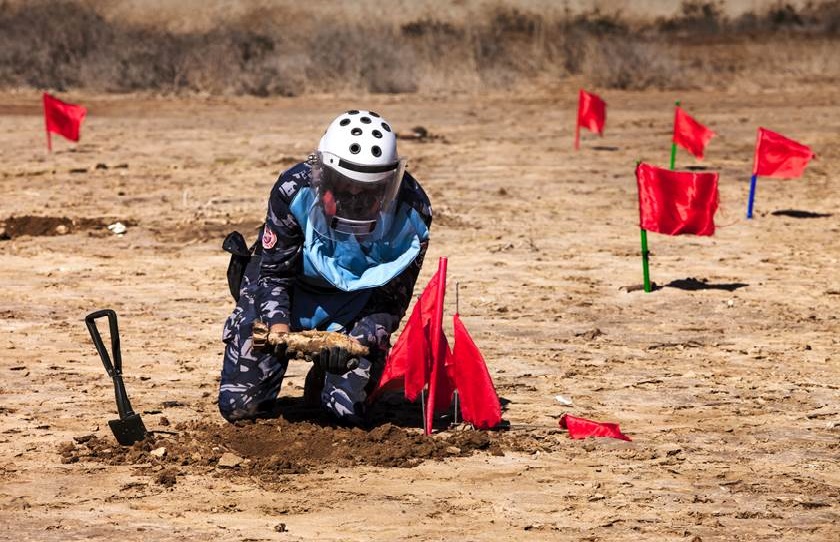Pehr Lodhammar
Even as the world struggles to put the worst of the Covid-19 crisis behind us, its lessons for global problem-solving remain to be applied elsewhere.
What has Covid-19 proven so far? Arguably, given talent and money available, in time, medical science, socially responsible health systems, governments, along with private sector partners found, in the coronavirus’ potential to harm everyone on the planet, the will and the way to unite to contain its spread. That effort continues.
In contrast, human-made problems often can seem intractable even as they inflict harm on innocents by the millions in far off places such as Iraq where I work for the United Nations Mine Action Service (UNMAS). The reason? Their socio-economic and political consequences can seem a distant distraction removed from daily life.
Not so. If we ‘connect the dots,’ the effects of the UN mission not done eventually find their way to our doorstep as a terrorist threat, a virulent ideology propagating in our backyard, a forced migration leading to humanitarian disaster, a downturn in our financial markets. The list goes on and, unlike a virus, ideologies don’t yield to vaccines.
All the more reason to finish our job which depends, in turn, on the continued generosity of countries such as New Zealand which recently contributed $2m to the United Nations Voluntary Trust Fund for Assistance in Mine Action. In 2019, such support enabled us to reach nearly 450,000 Iraqis exposed to explosive threats with risk education messages including documented cases whereby those specifically intended for women and children have saved lives.
The outcome of our work is best seen in this global context as ‘dot one,’ a pre-requisite contributing to Iraq’s return to its former status as a politically-stable, middle-income country which begins with access to infrastructure – to water treatment plants and wells, roads and bridges, hospitals and schools, factories and fields, houses and cultural sites, power lines and cell towers – cleared of explosive threats thereby enabling rehabilitation to proceed.
In 2019, UNMAS – among other organisations also conducting explosive hazard clearance – alone cleared 5,346,906 sqm and conducted 136 clearance tasks enabling the United Nations Development Programme (UNDP) and the Government of Iraq to continue rehabilitation of key infrastructure.
While that’s very positive, progress to date is not the point. More important is the work remaining for reasons both humanitarian and financial.
According to the UN’s International Organization for Migration, as of May 2020, as many as 1.4 million Iraqis still live in tents, some for as long as six years, waiting to return to a safe home. They endure winter cold and summer heat. They are deprived of jobs and educational opportunities. They often suffer from malnutrition, poor sanitation, and depression. According to the Iraq’s Ministry of Health, between 2017 and 2018, the 42 suicides among the 250,000 internally displaced persons (IDP)living in Duhok’s camps alone were five times the national average, and four in five were women.
A World Bank study in 2018 estimated that as many as 130,000 houses in areas formerly occupied by ISIS needed clearance before they could be rebuilt. According to government data, in one instance, ISIS placed 200 mines in a single village of 22 families. In Ramadi, in 2016, 200 people who returned ahead of clearance lost their lives to improvised explosive devices (IED).
The clearance work is slow and dangerous especially in urban environments where IEDs can be hidden anywhere – in walls, in air conditioning units, under artificial rocks, attached to a child’s doll left on a playground, concealed beneath a woman’s garment.
Meanwhile, ISIS remains active as an insurgency. Any rehabilitation and recovery delays work to its ideological and recruiting advantage by perpetuating economic hardship, political unrest, social strife, and individual anxiety, thereby eroding public confidence and trust in the government and exploiting a “next generation” of vulnerable, alienated, despondent groups, especially youth, without jobs, education, money or prospects of a better life.
Those of us working for the dignified, voluntary return to a safe home for Iraq’s IDP know the importance of bricks-and-mortar to the winning of hearts-and-minds and the eventual defeat of an ideology that spans continents and invades islands with impunity. Better to defeat it at the source than at home. Now is the time to finish our job.

